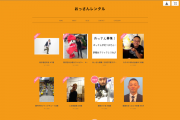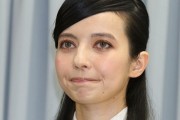San Francisco Bay Area consultant Kaifu Michi made big waves on the Japanese internet this week when she published a Japanese-language article about the companies involved in JETRO San Francisco, which were publicly announced in July. However, it wasn’t the business news that caught netizens attention, but a brief aside into Kaifu’s feeling that the name of the popular “O~i Ocha” brand of popular tea is inherently sexist. “O~i” is an informal expression commonly used to get someone’s attention, and it seems that to Kaifu, the masculine connotation of “o~i” makes the name sound like a man roughly commanding a woman to bring him some tea. Presumably, Kaifu is drawing on the traditional cultural expectation that women should serve tea to male household members and guests, although she doesn’t quite make her reasoning explicit in the article.
The article went viral based on that one sentence alone, after netizens quickly rose to defend the popular brand. Some pointed out that it’s sexist to assume that women can’t use “O~i” just as freely as men do, while others took the opportunity to point out perceived reverse sexism in the world around them. Few were sympathetic to her idea. Is Kaifu voicing a necessary objection to gender norms in Japanese society, or is the naming of tea truly a battle too small?
From Yahoo! Japan:
Is the “O~i Ocha” Brand Name “Male Chauvinism”? Does the “O~i” Sound Bring to Mind the Word “Man”?
The naming of Ito En’s hit green tea product “O~i Ocha” has become a hot topic online. While some are claiming that the sound of the name “O~i Ocha” carries connotations of “male chauvinism,” there has also been a strong reaction in opposition to that idea.
■ Although It Was Something of a “Digression,” There’s Been an Unusual Level of Response Online…
It all started with Silicon Valley management consultant Kaifu Michi’s article “Japanese Companies that Returned to Silicon Valley” on Nikkei Business Online (July 30, 2014). In an investigation of the Japanese companies participating in JETRO San Francisco, which were announced in July, Kaifu reported a record high of 719 Japanese companies participating, which exceeds the 680 companies that participated in 2000. She also referred to Softbank’s acquisition of the American company Sprint, and described the current state of the local business efforts by the company Ito En, which sells “O~i Ocha.”
Amid the description, Kaifu slipped in a “digression” that had nothing to do with the content of the article, saying, “I think they might not get by with the male chauvinistic sound of that ‘O~i Ocha’ brand name…” But the internet responded strongly to that murmured parenthetical comment. It seems that the phrase “male chauvinistic sound” has set many ill at ease.
The article was flooded with objections, including “What an extreme false accusation www,” “What a persecution complex. She must not be pleased with anything anymore w,” “To begin with, even women normally say ‘O~i!’”, and “This is unthinkable… Her head is always full of perceived discrimination, I guess.”
In response, Kafu has been making comments on Twitter such as “It’s been a while since I’ve had these kinds of people emerge ww “ and “…Huh? My article is now the most viewed? Well… No matter what the reason, I’m thankful to everyone for reading it.”
“That Wasn’t Our Intention, and We Didn’t Receive Any Inquiries”
Ito En’s “O~i Ocha” went on sale in February of 1989, when they used the new naming to market the product they had been selling as “Sencha” as a new “brand.” After 25 years, the product has proven to be a true long seller.
Of course, in the past female employees at companies have been called “tea ladies,” and it was considered natural for them to brew tea for their male counterparts, so there’s been a tendency to point out gender discrimination in that respect. However, this has significantly improved recently, and situations where male employees serve tea to clients have become much less infrequent.
Even though conditions have improved, that doesn’t mean there haven’t been some voices on the internet showing understanding for Kaifu Michi’s complaint. She’s received comments such as “I think she’s trying to say that women are treated as servants,” “Well, I see what she’s trying to say…” and “I don’t think she’s entirely wrong…”
In response, Ito En has said “That (male chauvinism) absolutely wasn’t our intention, and until now we’ve never received any requests or inquiries (expressing a desire for us to change the product name).”
Incidentally, “O~i Ocha” is sold under the same product name in America, using the same logo. The company has explained that this choice reflects “a recent trend for ‘ Cool Japan.’”
The sales market for Japanese tea and healthy tea drinks, which includes “O~i Ocha,” has seen domestic sales in June (by month) up 0.2% from the previous year, and a 3.2% increase in volume. The accumulated total (May-June) also reflects favorable changes in the market, with a 1.6% increase in sales, and a 4.2% increase in volume.
Comments from Yahoo! Japan:
hir*****:
Only an idiot would complain that this is male chauvinism. More importantly, let’s do something about the Ladies Days taking over downtown.
mion:
What a false accusation.
ttk*****:
Well then Febreze is in big trouble. They made a commercial that makes it seem like men are dirty.
gin*****:
Is she stupid? Is female chauvinism alright, then? Because society is already totally flooded with it…
桐城山:
So then is ‘ O~i! Ryoma male chauvinistic too? This is pretty unthinkable. It’s like “female-male mixed relay” [as opposed to saying “male-female”, as is the norm] and such. It’s pretty tough dealing with these weirdos.
sug*********:
Well, I just think the netizens responding one by one are assholes…
wan*****:
Isn’t that whole way of thought the thing that’s really male chauvinistic? Or is she aiming for a society that’s female chauvinistic?
dac*****:
You can talk once you’ve done something about that Febreze commercial!
エルトゥールル2号:
Tajima Yoko [noted Japanese feminist], is that you!?
tra***** :
Since I grew up in a household where my dad was always calling for tea like, “O~i! Ocha!” I never really thought about it that way.
Comments from 2ch.net:
トペ コンヒーロ(庭)@\(^o^)/:
I don’t get it.
16文キック(SB-iPhone)@\(^o^)/:
Why? wwwww
ドラゴンスープレックス(岐阜県)@\(^o^)/:
What an extreme false accusation www
フルネルソンスープレックス(禿)@\(^o^)/:
I understand what she’s trying to say, but it’s going way too far.
ダブルニードロップ(茸)@\(^o^)/:
Is she stupid?
キングコングニードロップ(東京都)@\(^o^)/:
She’s crazy wwwww Is she always thinking about this kind of thing?
ムーンサルトプレス(茨城県)@\(^o^)/:
Isn’t she trying to say that women are being treated like servants? A persecution complex is an illness, you should go to the doctor.
ドラゴンスリーパー(チベット自治区)@\(^o^)/:
Weren’t women saying “O~i Ocha” in the commercial?
ツームストンパイルドライバー(やわらか銀行)@\(^o^)/:
Yep, women are saying it:
エメラルドフロウジョン(埼玉県)@\(^o^)/ [in response to above]:
Maybe they made that commercial anticipating that there would be idiots saying stuff like this. Now that you mention it, I’ve come to expect that there will always be asshole like this.








